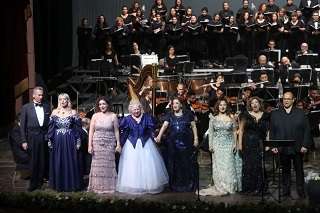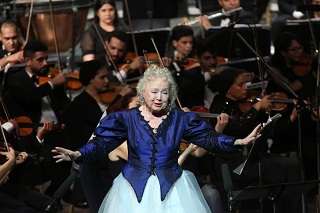|
Back
Offenbach - From the Seine to the Nile Cairo
Cairo Opera House
09/06/2023 -
Jacques Offenbach: Excerpts from La Périchole, La Grande‑Duchesse de Gérolstein, Les Contes d’Hoffmann, La Belle Hélène, La Vie parisienne, Orphée aux Enfers & Les Brigands
Jules Massenet: Meditation from Thaïs
Vittorio Monti: Czardas
Tahia Shams el Din, Dalia Farouk, Mona Rafla, Caroline Dumas, Dina Iskander (sopranos), Laila Ibrahim (mezzo), Georges Wanis (tenor), Reda El Wakil (bass), César Velev (violin)
Cairo Opera Choir, Mina Hanna (chorus master), Cairo Opera Orchestra Nayer Nagui (conductor)

(© Ossama el Naggar)
The inaugural concert of the Cairo Opera’s 2023‑2024 season was rather unusual in its choice of repertoire: a program of excerpts from the stage works of Franco-German composer Jacques Offenbach. The soloists were some of Egypt’s leading opera singers as well as those of a previous generation. They were celebrating French soprano Caroline Dumas, 88, a pedagogue who taught several Egyptian singers at Paris’s Ecole normale de musique. Dumas was the legendary Swiss baritone Charles Panzéra’s most prominent student. She sang Thaïs, Donna Elvira (Don Giovanni), Rosalinde in (Die Fledermaus), Micaëla (Carmen, Marguerite (Faust) and several other roles. She has a special attachment to Egypt and considers it her second home. She is emblematic of a centuries-long mutual love affair between Egypt and France.
Among the artistic, scientific and intellectual elite that supported the 1789 revolution in France were the Freemasons, and Ancient Egypt was the basis for the rites of Freemasonry. When Napoleon invaded Egypt in 1798, he brought a huge contingent of scientists and academicians eager to study the country. They studied its history, geography, topography, fauna and flora in an encyclopedic work, L’Etude de l’Egypte. It was also during that campaign that the French unearthed the Rosetta Stone that enabled French scholar Jean‑François Champollion (1790‑1832) to decipher Egyptian hieroglyphics.
The brief French invasion caused an abrupt shock in the Egyptian psyche, the first foreign incursion since the Crusaders, save for the Ottoman Turks in 1516‑17. It awakened a deep curiosity for the West and informed Egyptians of the West’s military superiority as well as their advances in science and medicine. This awakening by the French was Egypt’s baptism into Modernity.
When Mehmet Ali (1769‑1849), an ethnic Albanian from Thrace (present day Northern Greece), seized power in 1805 and became the founder of a dynasty that ruled until Nasser’s military coup in 1952, he embarked on an intense modernization campaign. He aimed to transform Egypt into a developed European state. He introduced crops suited to the climate including cotton which became Egypt’s main export, especially during the United States’s Civil War, when exports from the U.S. South became scarce. He built roads, bridges and a railway system. His offspring continued the dream with the construction of the Suez Canal, enabling maritime traffic to shorten distances between Asia and Europe, thereby avoiding the need to sail around the coast of Africa.
Both the Chairman of the Cairo Opera, Dr. Khaled Dagher, and French Ambassador Marc Baréty addressed the audience in English, French and Arabic – I might add surprisingly fluent Arabic of the latter. They lauded the collaboration between the Cairo Opera and various French musical institutions, including coproductions of Massenet’s Thaïs and Delibes’s Lakmé.
Popular and highly successful over the past three decades, bass Reda El Wakil delighted with his witty interpretation of “Pif, Paf, Pouf” from La Grande‑Duchesse de Gérolstein (1867). His “Scintille, diamant” from Les Contes d’Hoffmann (1881) was authoritative and even menacing. In contrast, soprano Tahia Shams sang Antonia’s aria “Elle a fui la tourterelle” from Les Contes d’Hoffmann with passion, conveying the tragic heroine’s melancholy and fragility.
In “Dites‑lui qu’on l’a remarqué” from La Grande‑Duchesse de Gérolstein, soprano Dalia Farouk delicately expressed the Duchess’s own fondness for the soldier Fritz as if she were a messenger for another woman. Her veiled affection was quite moving.
Soprano Mona Rafla was charm personified in both her amusing aria “Ah que j’aime les militaires” from La Grande‑Duchesse de Gérolstein and “Invocation à Vénus” from La Belle Hélène (1864). The latter was followed by the melodious duet “C’est le Ciel qui l’envoie... Ce n’est qu’un rêve” from the same operetta. Her Pâris was tenor Georges Wanis whose rich timbre is almost too luxurious for this light repertoire. His second contribution was the aria “Jadis vous n’aviez qu’une seule patrie” from Les Brigands (1869), with its catchy Spanish-sounding refrain. Frankly, it was a waste, as one would have liked to hear this robust voice in an aria or duet from Les Contes d’Hoffmann, a role he will hopefully do in the near future.
Dinah Iskandar was hilarious in “Je suis veuve de colonel” and highly spirited in “On va courir,” both from La Vie parisienne (1866). Laila Ibrahim’s rich mezzo was impressive in both the aria “Oh mon cher amant” from La Périchole (1868) and the Barcarolle from Les Contes d’Hoffmann. In the former, she was able to convey both love and sadness. Her well-enunciated final words “...et je signe La Périchole qui t’aime et n’en peut plus » were quite moving.

C. Dumas (© Ossama el Naggar)
Most touching was the charming aria “Ah quel dîner je viens de faire » from La Périchole. Despite her advanced age, Caroline Dumas conveyed charm in this aria where the protagonist, invited to a lavish dinner, is inebriated. Her voice may no longer be in its prime, but her interpretation was definitively masterful and her diction exemplary. Diction is of utmost importance in operetta as understanding the text in this form of musical theatre is crucial. Despite that the voices of some of Dumas’s students are no longer in their prime, all the singers showed a good command of the French language and sang with a clear comprehensible diction, proof of the veteran soprano’s excellence as a teacher.
Chorus master Mina Hanna has obviously worked hard with this chorus, who sang the opening piece “Du Vice‑Roi c’est aujourd’hui la fête“ from La Périchole, and the exuberant finale “Feu partout“ from La Vie parisienne, as well as accompanied soloists in other pieces. However, unlike the soloists, some members of the choir did not have clear diction in French. Conductor Nayer Nagui led the Cairo Opera Orchestra with panache. He was also brilliant in his choice of excerpts for this Offenbach concert.
The two pieces for violin were a pleasant respite from vocal music. Franco-Bulgarian violinist César Velev’s virtuosity was highly appreciated by the public. The tempo in the Massenet piece was a touch slow, making it too saccharine-like. The lively Czardas were fiery, as they should be, and many in the public broke into a clapping accompaniment. Alas, the version chosen was not the extended one but an abridged variant.
Perhaps the unusual choice of Offenbach was not purely fortuitous. The pinnacle of achievement of Mehmet Ali’s dynasty was the construction of the Suez Canal, and present for its inauguration was none other than France’s Empress Eugénie, wife of Emperor Napoleon III, a grand guest of honour indeed. This very same Eugenie was Offenbach’s main patroness.
In November 1869, coinciding with the Suez Canal’s opening, the Cairo Opera House too was inaugurated, with a performance of Rigoletto. Aida, originally commissioned for the event, was delayed by the Franco-Prussian War. The following year, several of Offenbach’s operettas were performed in Egypt and left their mark on the local musical scene.
In the 1920s, Egyptian composer Sayyed Darwish wrote several operettas inspired by (especially in their biting lyrics) Offenbach, replete with satire of Egypt’s rulers and its military. Whether deliberate or fortuitous, the decision to celebrate Offenbach in Cairo was both felicitous and appropriate.
Ossama el Naggar
|